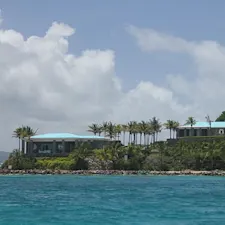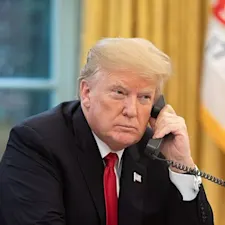
Cold War Talk Heats Up in Greenland, Where Billions Lay Buried Beneath the Ice
The settlement of Siorapaluk in northern Greenland seen from a distance, 1979. Photo by Finn-j under CC0 1.0.
When former U.S. President Donald Trump suggested purchasing Greenland in 2019, his remarks were met with global bemusement and sharp rebukes from Denmark and Greenland. In 2025, as Trump reiterated his ambition, the strategic and economic allure of the Arctic territory reignited conversations about its global significance. Beyond the humor and controversy, Greenland is not just a large patch of ice — it's a geopolitical goldmine.
The History and Governance of Greenland
Greenland is the world's largest island, boasting over 800,000 square miles, most of which is blanketed by ice. A part of the Kingdom of Denmark since 1721, Greenland gained home rule in 1979 and autonomy in 2009. While Denmark oversees its defense and foreign policy, Greenland's local parliament manages domestic matters.
The island is home to around 56,000 people, primarily Indigenous Inuit, whose cultural and political aspirations often lean toward full independence.
 Itilleq, Greenland. Photo by David Stanley under CC BY 2.0.
Itilleq, Greenland. Photo by David Stanley under CC BY 2.0.
Despite Greenland's autonomy, its reliance on an annual subsidy of $500 million from Denmark has tethered it to Copenhagen, as reported by CNN. Independence remains a goal for many Greenlanders, but questions about economic self-sufficiency, particularly with Denmark's financial support at stake, complicate this dream.
Why Greenland Matters Strategically
Trump's renewed interest in Greenland stems from its immense strategic and economic potential. Here are key reasons why Greenland matters:
Arctic Gateway: Greenland's location bridges North America and Europe, making it pivotal for military strategy. The U.S. Air Force operates the Pituffik Space Base (formerly Thule Air Base) in northwest Greenland, a critical site for missile defense and space surveillance. Control of Greenland could bolster U.S. capabilities in Arctic geopolitics, especially as Russia and China seek to increase their presence in the region.
Mineral Wealth: Beneath Greenland's icy surface lies a treasure trove of resources, including rare earth elements crucial for advanced technologies. The race to harness these resources pits global powers against one another, with the U.S. eager to counter China's dominance in rare earth production.
Climate Change Opportunities: As the Arctic ice melts, new shipping lanes and untapped resources become accessible. Greenland could serve as a central hub for Arctic trade routes, enhancing its global importance.
Paths to Control: A Hypothetical List
Should the U.S. seriously consider acquiring Greenland, it would have limited avenues to explore:
Purchase: Historical precedent exists for the U.S. purchasing territories, such as Alaska from Russia in 1867. The Truman administration even offered Denmark $100 million for Greenland in 1946, as reported by PBS. However, Denmark and Greenland have firmly stated the island is not for sale.
Diplomatic Negotiation: A more feasible option might involve a special association, akin to U.S. agreements with the Marshall Islands, where Greenland retains sovereignty but receives economic and military support from the U.S. in exchange for strategic concessions.
Military Action: While Trump hinted he wouldn't rule out using force, such a move would trigger NATO's Article 5, obligating member nations to defend Denmark. The repercussions of military aggression would be catastrophic for U.S. relations with allies.
Economic Coercion: The United States could attempt to leverage tariffs or sanctions against Denmark to force negotiations. However, this tactic comes with risks; it could isolate the U.S. diplomatically, weakening its standing within NATO and the EU.
Russia's Response and Geopolitical Ramifications
Russia has monitored U.S. interest in Greenland with suspicion, viewing the Arctic as its strategic backyard.
 Russian coat of arms, Saint Petersburg, Russia. Photo by Vyacheslav Argenberg under CC BY 4.0.
Russian coat of arms, Saint Petersburg, Russia. Photo by Vyacheslav Argenberg under CC BY 4.0.
The Kremlin has emphasized the Arctic's importance to Russian national security and warned against destabilization in the region. European nations have also voiced concern, with German and French leaders affirming that Greenland's sovereignty must be respected.
Trump's remarks, however, do more than irk allies — they create opportunities for adversaries. Russian President Vladimir Putin has historically sought to fracture Western alliances, and a U.S. push to annex Greenland could deepen divisions within NATO. Additionally, China's Arctic ambitions could gain momentum as Greenland seeks economic partnerships to offset reliance on Denmark.
The Bigger Picture: Greenland and the Future of the Arctic
At its core, the debate over Greenland underscores the ever-increasing importance of the Arctic in global politics. As the region warms, new economic and strategic opportunities arise, intensifying competition among nations. For Greenland, this means navigating a delicate balance between aspiring for independence and managing the interests of global superpowers.
The prospect of the U.S. acquiring Greenland remains unlikely, but the island's strategic significance ensures it will remain a focal point of geopolitical intrigue. Whether through diplomacy, economic partnerships, or military alliances, Greenland's role in shaping the Arctic's future is undeniable.
References: Why Trump Wants Greenland and What Makes It a Strategic Polar Outpost | 4 Reasons Why the U.S. Might Want to Buy Greenland – If It Were for Sale, Which It Isn't | Trump Wants to Buy Greenland Again. Here's Why He's So Interested in the World's Largest Island | Russia Keeping Close Eye on Trump's Claim to Greenland | Pressure on China and Pure 'Trolling': Why Trump Is Pushing an Expansionist Agenda | What is Greenland worth? A super summary of valuation discussions | Greenland's National Day, the Home Rule Act (1979), and the Act on Self-Government (2009)























